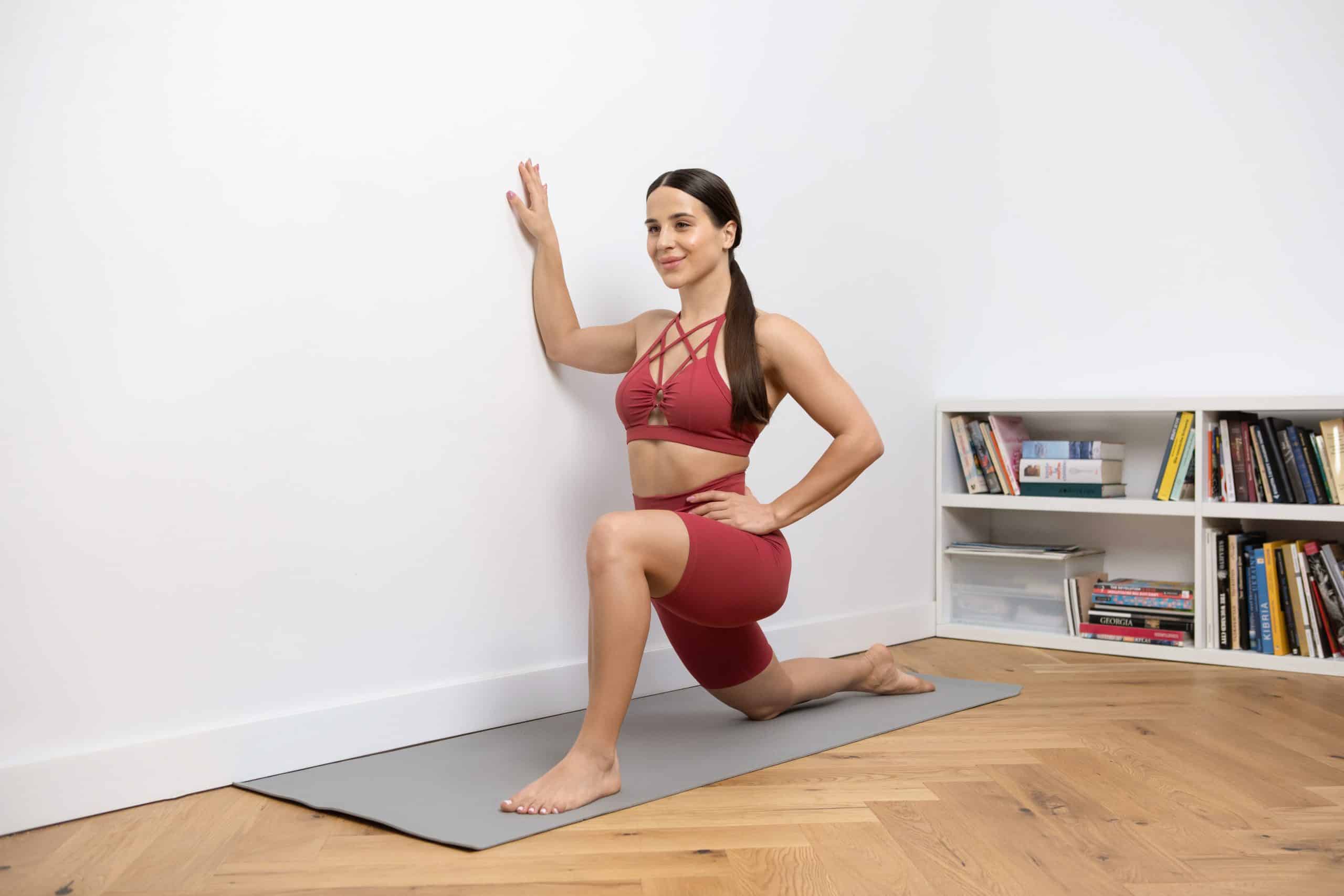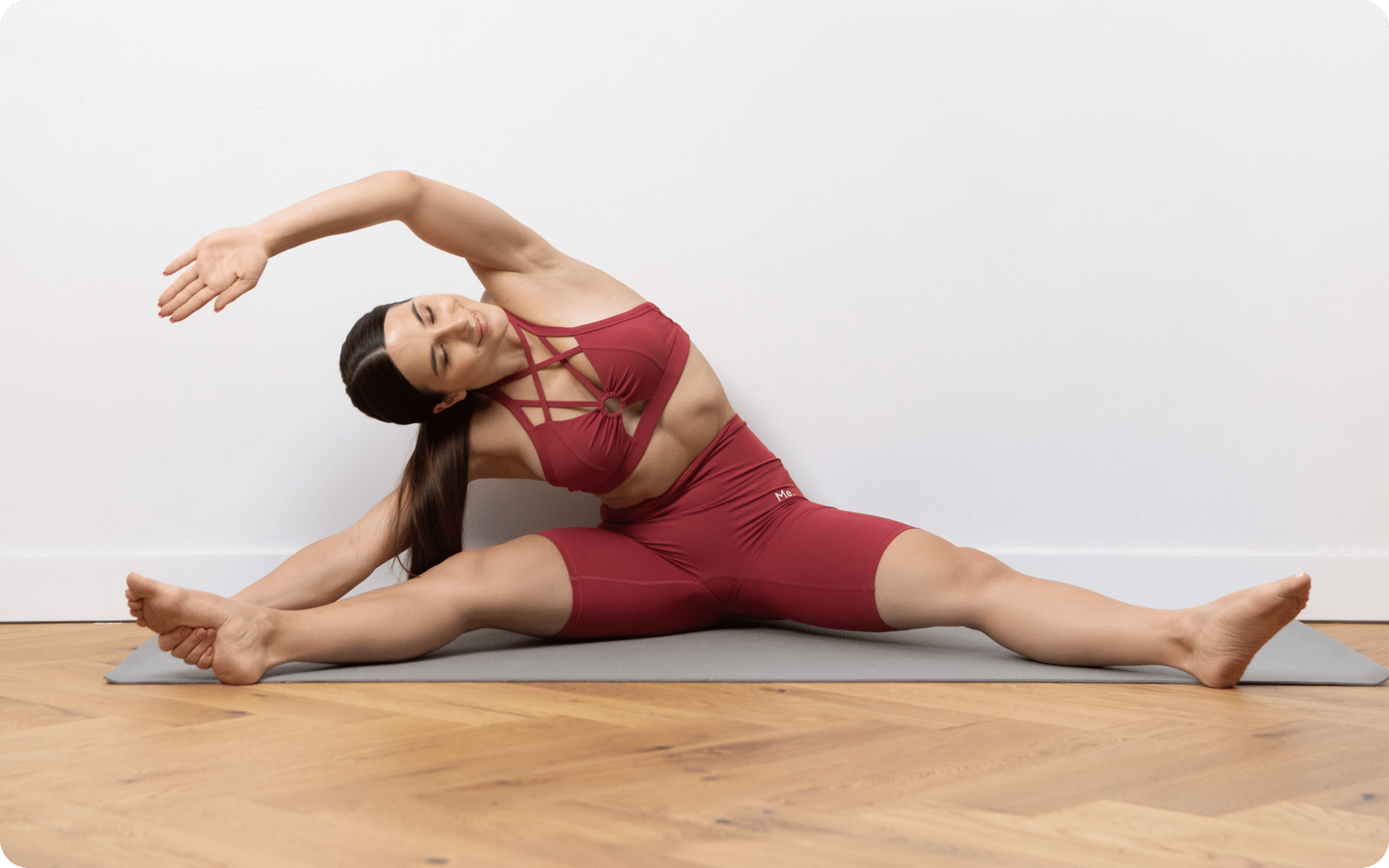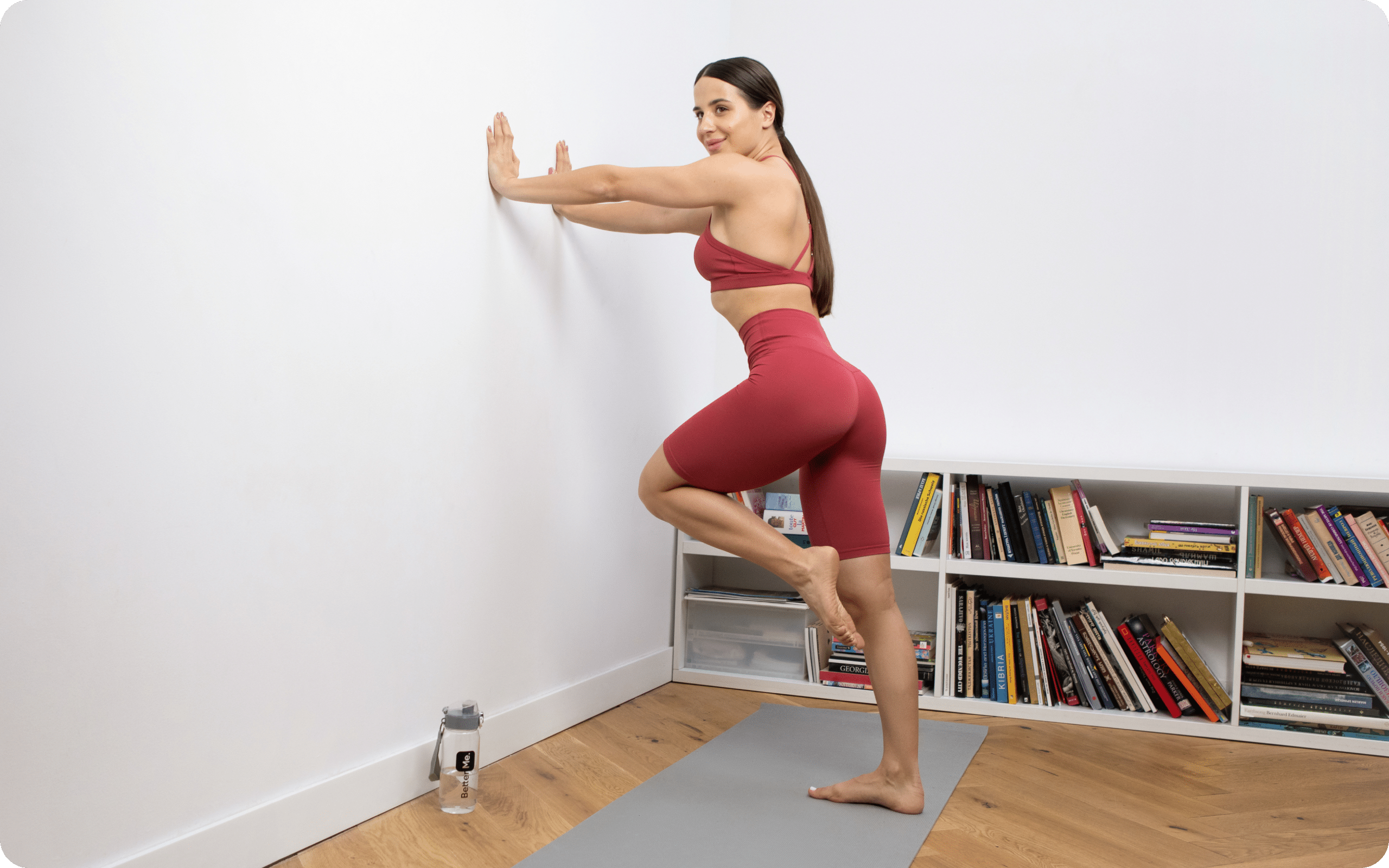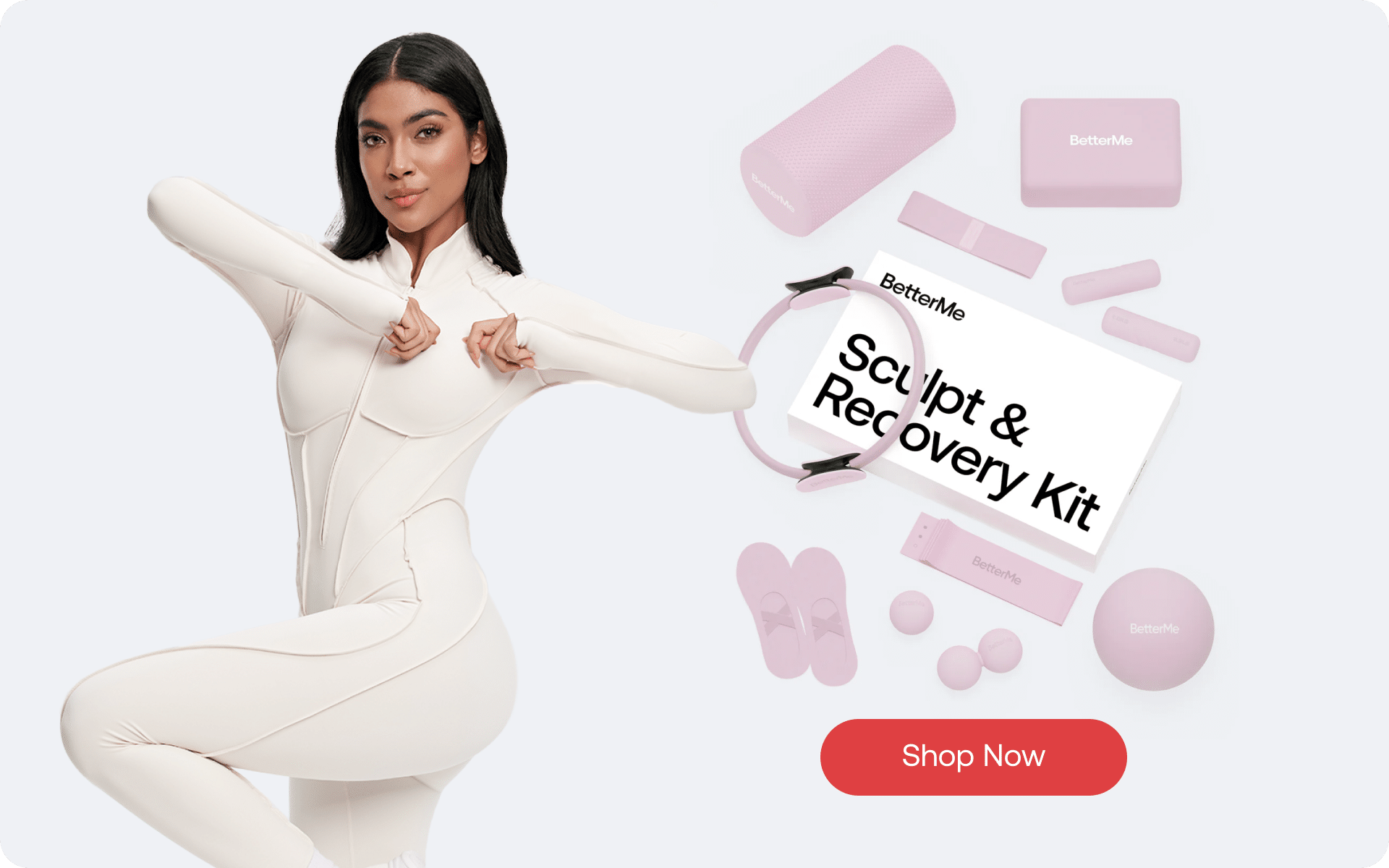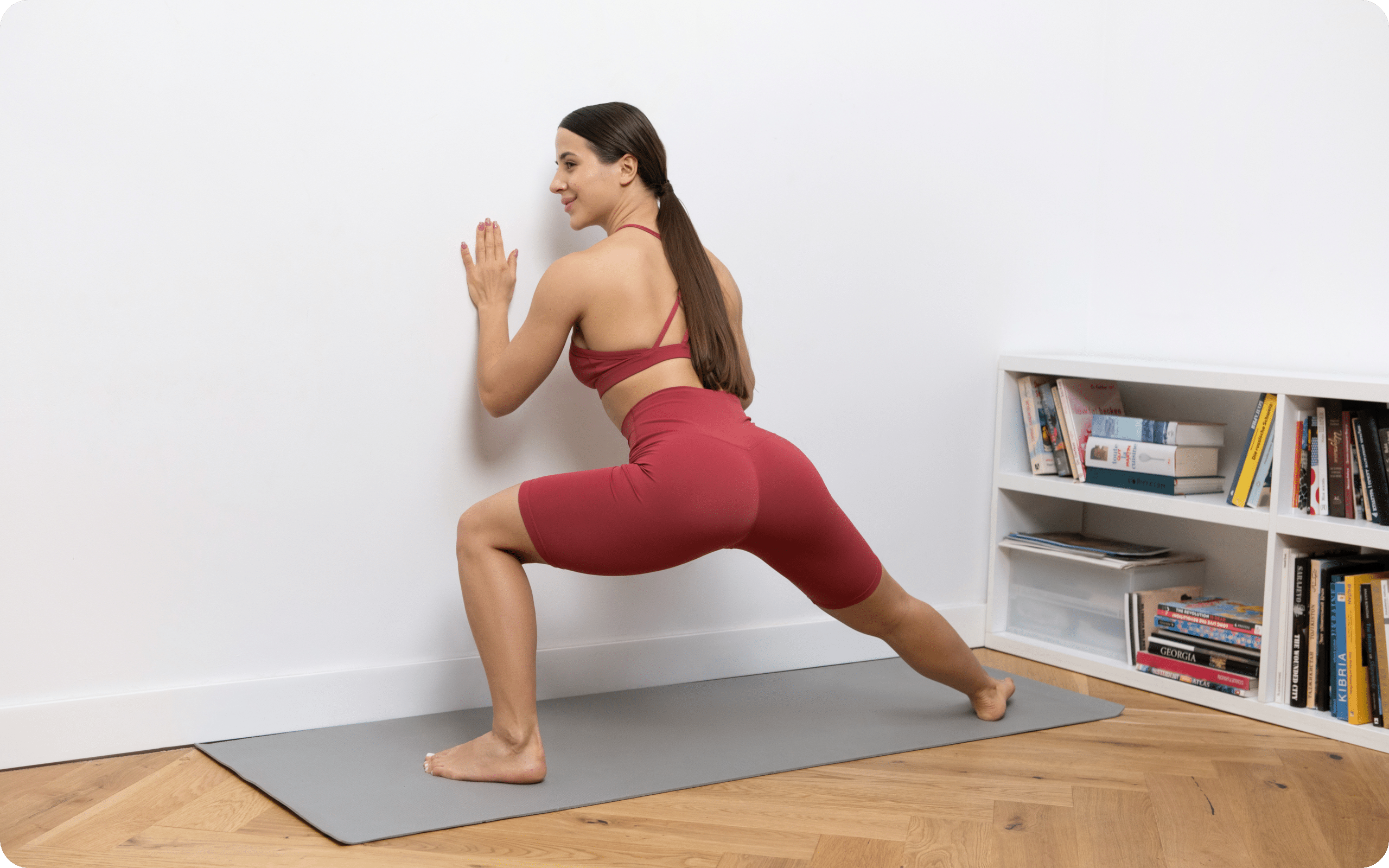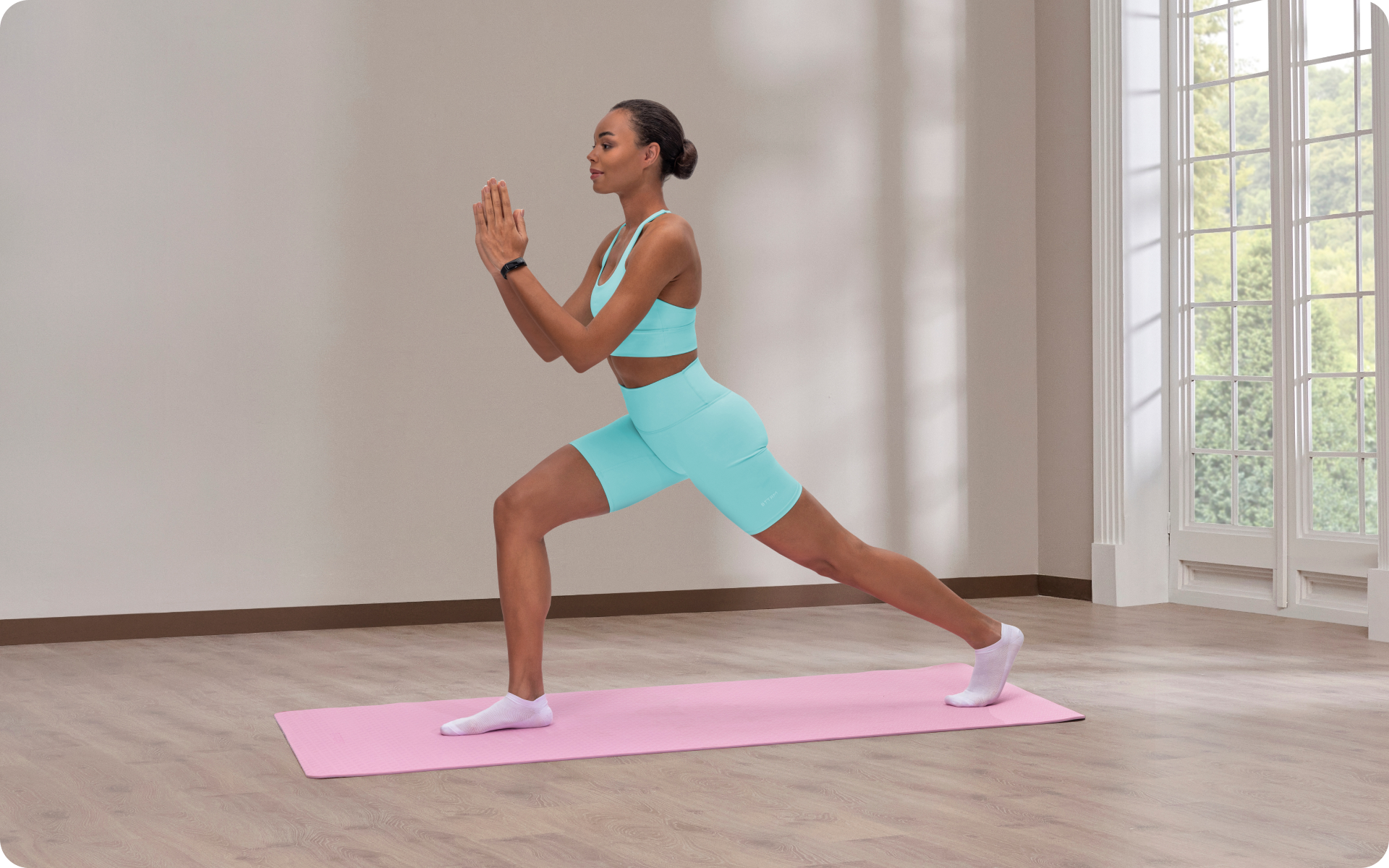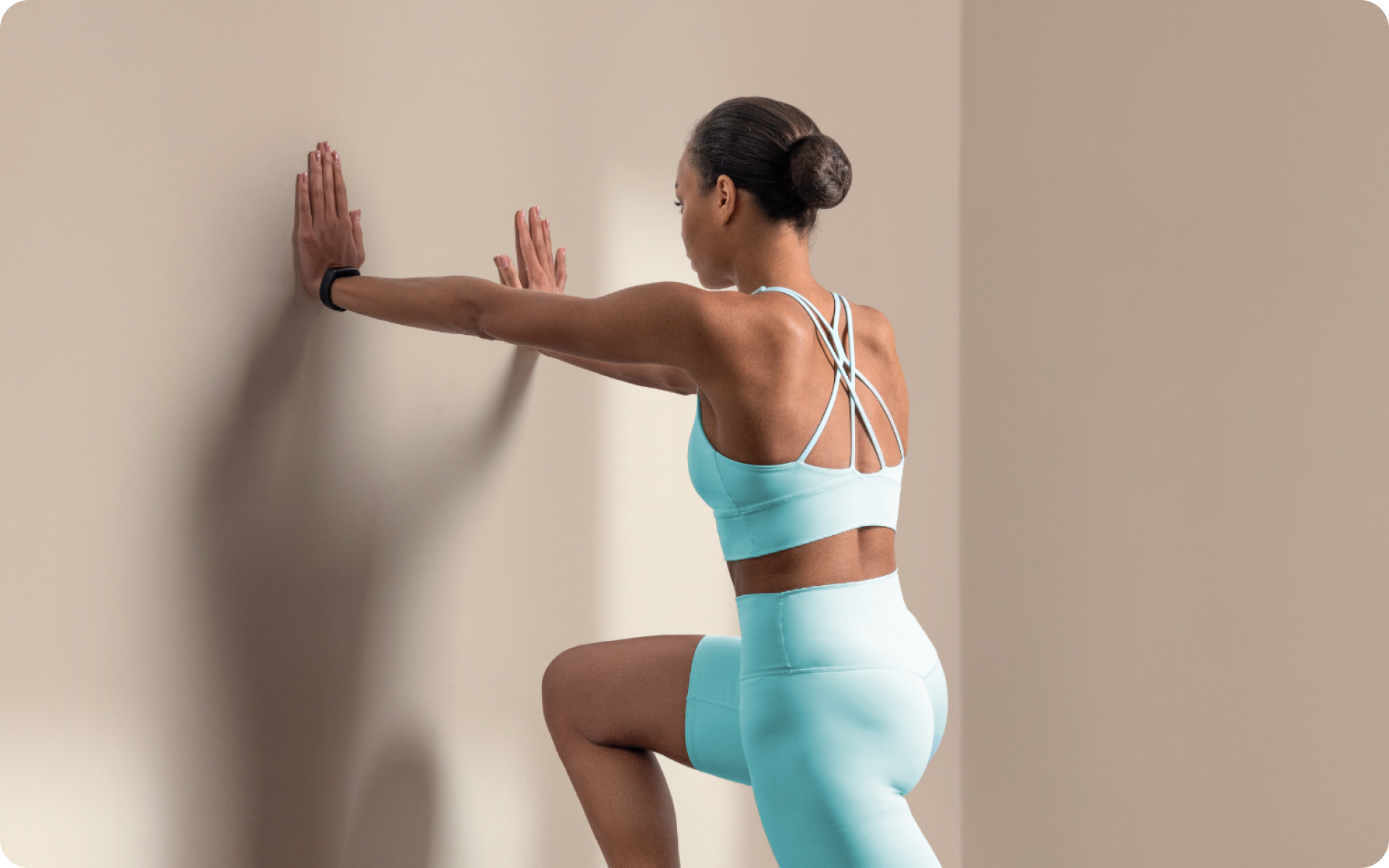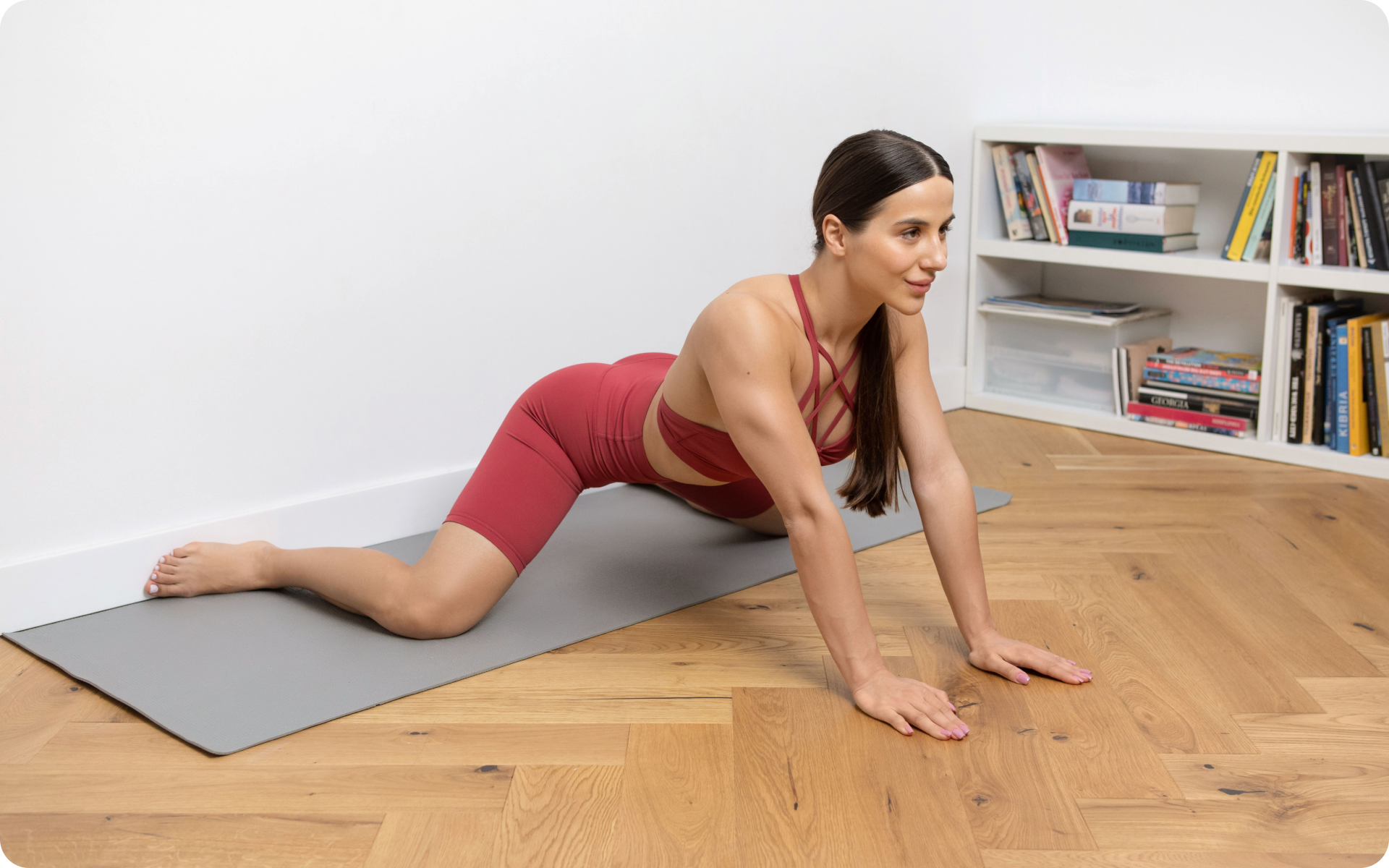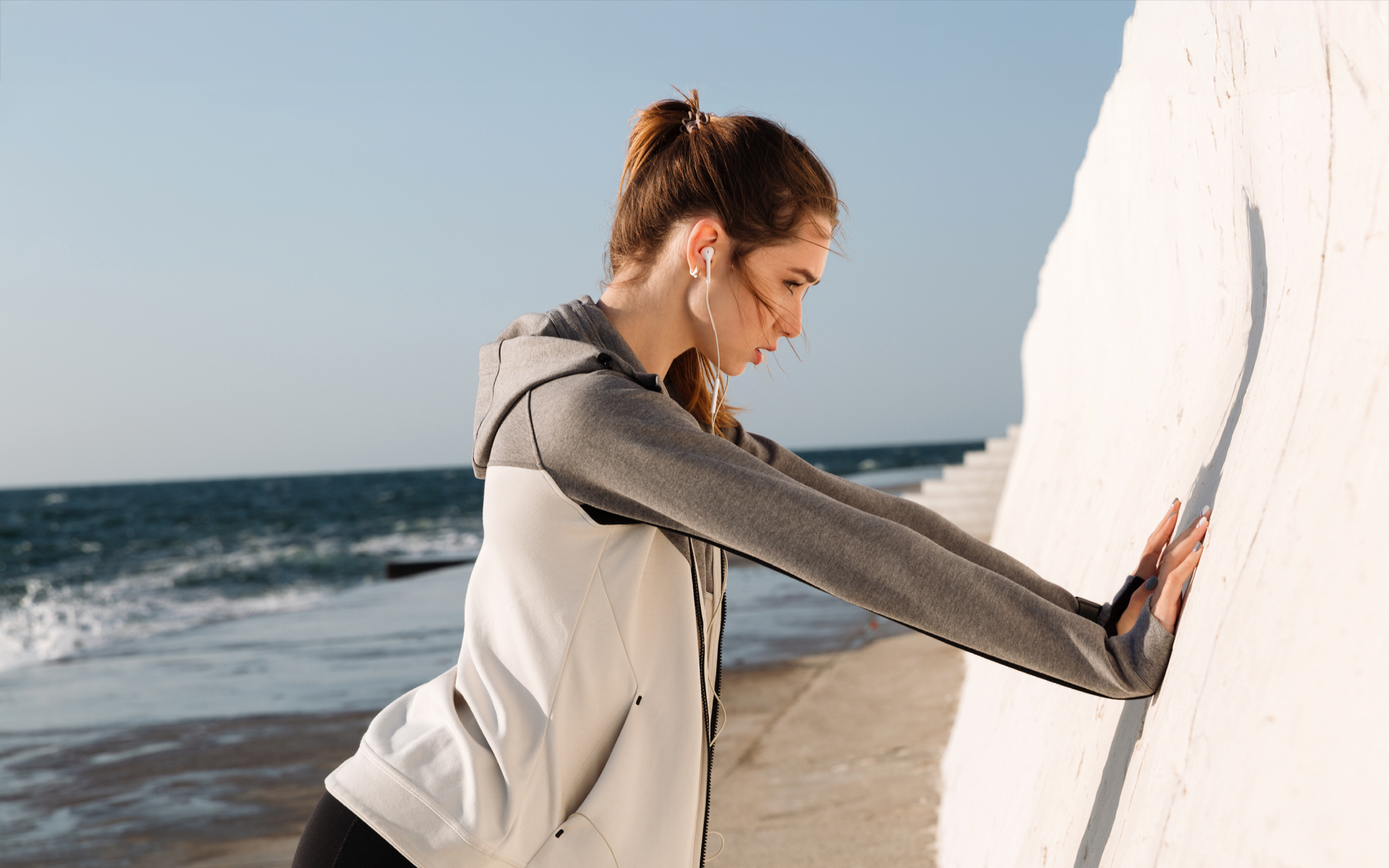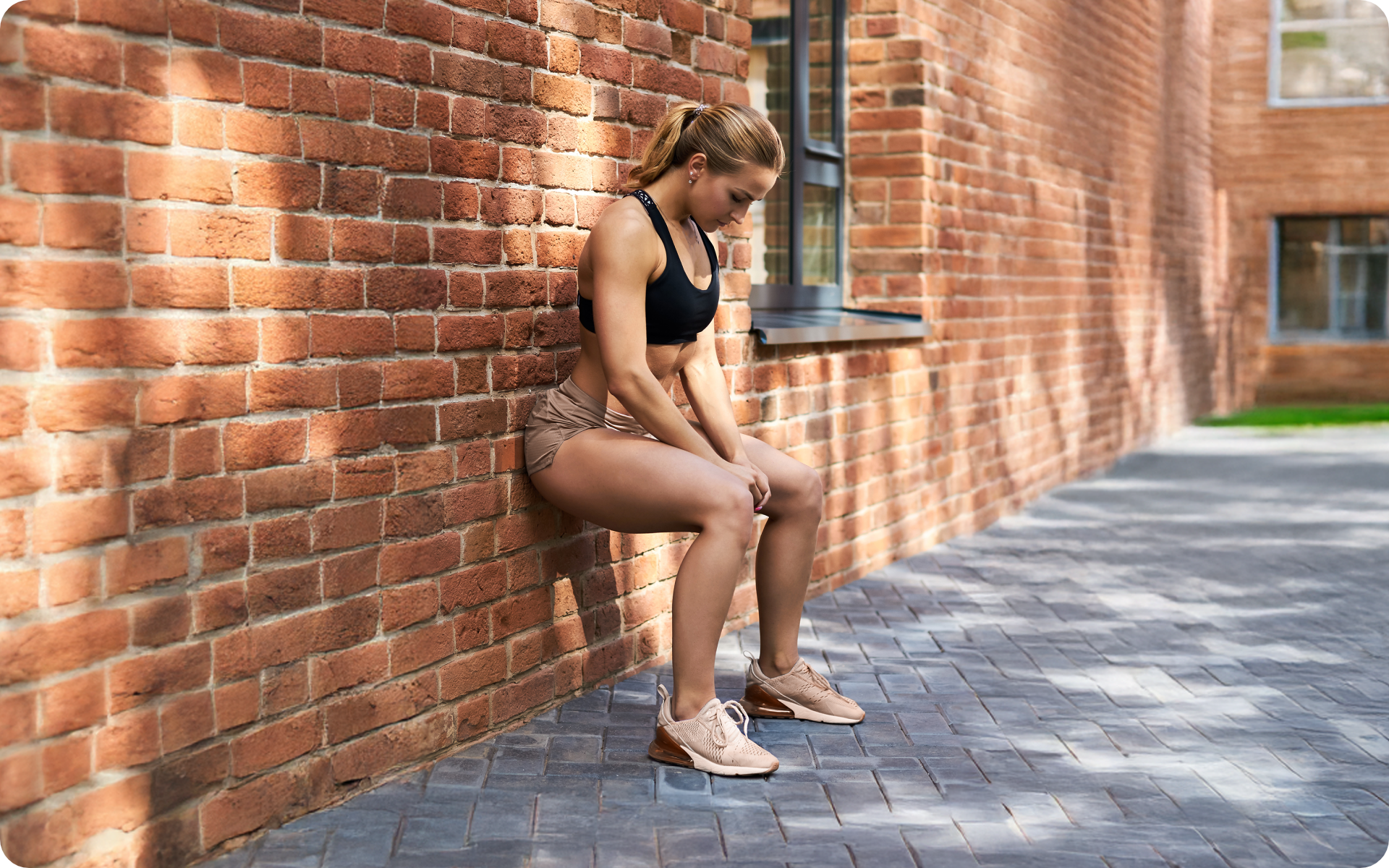The Wall Pilates 21-Day Challenge is a gravity-defying workout that will make your core scream “Thank you!”, and your inner balance beam champion beam with pride. This isn’t your average Pilates class; we’re talking about a unique fusion of traditional mat exercises and vertical wall challenges that bring an entirely new dimension to your fitness journey. Over the course of 21 days, you’ll be pushed out of your comfort zone with a series of creative and fun workouts powered by BetterMe. Your strength, balance, and agility will be tested, and you will come out of it with a stronger core, improved posture, and a newfound sense of confidence. So if you’re ready to crush those 21 days and transform your body from the inside out, stick around as we’ve got the insider scoop on how to maximize every plank, twist, and leg lift so that you can conquer this challenge!
How Does Wall Pilates 21-Day Challenge Work?
The goal of the challenge is to help participants improve their fitness, strength, and flexibility through a series of Wall Pilates exercises over a 21-day period.
Here’s a basic outline of the process:
- Sign up. Participants usually need to sign up for the challenge, which may involve providing an email address or downloading a dedicated app, like the BetterMe app.
- Access the program. Once registered, you’ll gain access to the Wall Pilates workout plan, which includes daily exercises designed specifically for the 21-day challenge.
- Daily exercises. The challenge consists of daily Wall Pilates workouts that are designed to progressively increase in intensity and complexity. These exercises will target key muscle groups, including those of your core/trunk, arms, and legs, using the wall as a tool to enhance traditional Pilates movements.
- Rest days. It’s essential to include rest days within the 21-day challenge, allowing your muscles to recover and prevent overtraining. The program may incorporate active recovery days, featuring gentle stretching or light activity to promote relaxation and blood flow, which supports optimal muscle recovery.
Note that individual experiences and results may vary. Be sure to consult with a healthcare professional or certified Pilates instructor before starting any new exercise program, especially if you have any pre-existing medical conditions, injuries or concerns.
Make The Most Out Of Your Wall Pilates 21-Day Challenge
To make the most of the Wall Pilates 21-Day Challenge, follow these tips to maximize your results and ensure a successful experience:
- Set realistic goals. Before starting the challenge, establish clear and achievable goals tailored to your current fitness level and desired outcomes.
- Prepare your space. Choose a clean, clutter-free area with enough space for your mat and wall exercises, ensuring a safe and comfortable environment for your workouts.
- Focus on proper form. Pay close attention to your form and alignment during each exercise, as this can significantly impact your results and reduce the risk of injury.
- Stay consistent. Commit to completing the daily workouts as scheduled, maintaining consistency throughout the entire 21-day challenge.
- Incorporate rest days. Allow adequate rest and recovery by incorporating rest days into your challenge schedule, in order to give your muscles time to repair and grow stronger.
- Listen to your body. If you experience pain or discomfort during any exercise, stop and assess your form or consider modifying the movement. Consult with a certified Pilates instructor or healthcare professional if needed.
- Stay hydrated. Ensure you’re drinking enough water throughout the challenge to support optimal muscle and nerve function and overall health.
- Fuel your body. Maintain a nutritionally adequate eating pattern that supports your individual requirements, activity levels, goals, and needs. This will not only support optimal physical performance but adequate recovery too.
- Track your progress. Monitor your progress by taking photos, recording measurements, or noting improvements in strength and flexibility to stay motivated and accountable.
- Engage with the community. If the challenge offers a community element, such as a Facebook group or forum, actively participate by sharing your experiences, asking questions, and supporting fellow challengers.
- Celebrate your achievements. At the end of the 21-day challenge, take time to acknowledge and celebrate your accomplishments, regardless of whether you’ve reached your initial goals. Use the experience as a stepping stone toward continued progress in your fitness journey.
Read More: How To Do Wall Pilates At Home: A Quick Guide
Is Wall Pilates Challenge At Home Effective?
The Wall Pilates Challenge at home is not only effective, but it also offers numerous benefits that contribute to overall fitness and well-being (4) (7).
Let’s dive into some of the reasons why this innovative workout method is worth your time and effort:
Full-Body Workout
Wall Pilates engages key muscle groups, including your deep core muscles, and those of the upper and lower body, providing a comprehensive workout that targets multiple areas simultaneously.
Improved Balance And Stability
Performing exercises against the wall challenges your body’s proprioception, or its ability to perceive its body’s position and the movement, location, and action of parts of the body. This helps improve balance, coordination, and overall stability.
Increased Core Strength
With the added resistance from the wall, your core muscles have to work harder to maintain proper form and alignment. This can lead to a stronger, more defined midsection.
Low-Impact Exercise
Wall Pilates is gentle on your joints, making it an excellent option for those recovering from injuries or looking for a low-impact workout that still delivers results.
Enhanced Flexibility
The stretching and lengthening movements in Wall Pilates increase flexibility, which can help prevent injuries and improve overall mobility.
Convenience
One of the best things about the Wall Pilates Challenge at home is that it requires minimal equipment– a wall and a mat is all you need. Additionally, this can be done in the comfort of your own home too, fitting seamlessly into your busy schedule.
Adaptability
Wall Pilates offers a wide range of exercises and modifications, making it suitable for all fitness levels, from beginners to seasoned pros.
Motivation
The 21-day challenge format creates a sense of commitment and motivation, pushing you to stay consistent and achieve your fitness goals.
If you wish to free yourself from all the extra pounds that have been weighting you down for way too long, start using the BetterMe app and overhaul your entire life!
How Much Pilates Should You Do In A Week?
The ideal frequency of Pilates workouts per week depends on your fitness goals, experience level, and available time. However, as a general guideline, most experts recommend practicing Pilates anywhere from 2-4 times per week for optimal results.
1. Beginners
If you’re new to Pilates, start with 2-3 sessions per week, allowing at least one rest day in between each workout to give your muscles time to recover and adapt. As you become more comfortable with the exercises, you can gradually increase the frequency.
2. Intermediate And Advanced Level
For those with more experience, 3-4 sessions per week are ideal for maintaining and improving core strength, flexibility, and overall fitness.
3. Complementary Workout
If you’re incorporating Pilates as a supplemental workout to other forms of exercise (such as cardio or strength training), 2-3 sessions per week can provide balance, stability, and muscular endurance benefits without overtaxing your body.
4. Rehabilitation Or Injury Prevention
If you’re using Pilates for rehabilitation or injury prevention purposes, it’s best to consult with a healthcare professional or certified Pilates instructor, who can recommend an appropriate frequency based on your specific needs and circumstances.
Remember that consistency is key when it comes to seeing and maintaining results. Make sure to listen to your body and adjust your Pilates routine accordingly to ensure you’re getting the most out of your workouts while avoiding overtraining or injury.
Effects Of Doing Pilates Everyday
While practicing Pilates every day might seem like a great way to fast-track your progress, it’s essential to consider the potential effects on your body and overall fitness.
Here’s what could happen if you do Pilates every day:
1. Improved Muscle Tone And Strength
With consistent practice, you’ll likely notice increased muscle tone, particularly in your core, as well as improved strength throughout your body (5).
2. Enhanced Flexibility And Posture
Daily Pilates practice can lead to greater flexibility and better posture, as it focuses on elongating and strengthening muscles, while also promoting proper alignment through movements (1).
3. Increased Mind-Body Connection
The emphasis on breathwork and intentional movement in Pilates helps cultivate a stronger mind-body connection, which may improve with daily practice (6).
4. Potential For Overtraining
Just like with any exercise routine, doing Pilates every day without adequate rest and recovery can lead to overtraining. This can cause muscle fatigue, soreness, decreased performance, and a higher risk of injury (3).
Yanking yourself back in shape has never been so easy with our game-changing fitness app! Start transforming your life with BetterMe!
5. Plateau In Progress
Your body needs time to recover and rebuild muscle tissue after workouts (2). Without sufficient rest, you may hit a plateau in your progress and not see the desired results.
Read More: Why Is Wall Pilates So Effective?
6. Less Variety In Your Workout Routine
Focusing solely on Pilates may limit the variety in your exercise regimen. Incorporating other forms of exercise, such as cardio and strength training, can help create a well-rounded fitness routine and prevent boredom.
To maximize the benefits of Pilates while minimizing the risks, it’s generally recommended to practice Pilates 2-4 times per week, allowing for rest days in between sessions.
Listen to your body, and consider consulting with a certified Pilates instructor to develop a balanced and effective workout plan tailored to your individual needs and goals.
The Bottom Line
Wall Pilates 21-Day Challenge can be an effective and engaging way to improve your overall fitness, strength, and flexibility.
By setting realistic goals, maintaining proper form, staying consistent with workouts, incorporating rest days, listening to your body, and engaging with the community, you can maximize your results and enjoy a successful experience.
Remember that consistency and commitment are key, so celebrate your achievements and use the challenge as a stepping stone toward continued progress in your fitness journey.
DISCLAIMER:
This article is intended for general informational purposes only and does not serve to address individual circumstances. It is not a substitute for professional advice or help and should not be relied on for making any kind of decision-making. Any action taken as a direct or indirect result of the information in this article is entirely at your own risk and is your sole responsibility.
BetterMe, its content staff, and its medical advisors accept no responsibility for inaccuracies, errors, misstatements, inconsistencies, or omissions and specifically disclaim any liability, loss or risk, personal, professional or otherwise, which may be incurred as a consequence, directly or indirectly, of the use and/or application of any content.
You should always seek the advice of your physician or other qualified health provider with any questions you may have regarding a medical condition or your specific situation. Never disregard professional medical advice or delay seeking it because of BetterMe content. If you suspect or think you may have a medical emergency, call your doctor.
SOURCES:
- Effect of mat pilates exercise on postural alignment and body composition of middle-aged women (2016, ncbi.nlm.nih.gov)
- Exploring the Science of Muscle Recovery (n.d., blog.nasm.org)
- Overtraining Syndrome (2012, ncbi.nlm.nih.gov)
- Pilates: how does it work and who needs it? (2011, ncbi.nlm.nih.gov)
- Pilates (2011, ncbi.nlm.nih.gov)
- Pilates and Mindfulness: A Qualitative Study (2012, researchgate.net)
- Pilates – health benefits (n.d., betterhealth.vic.gov.au)
